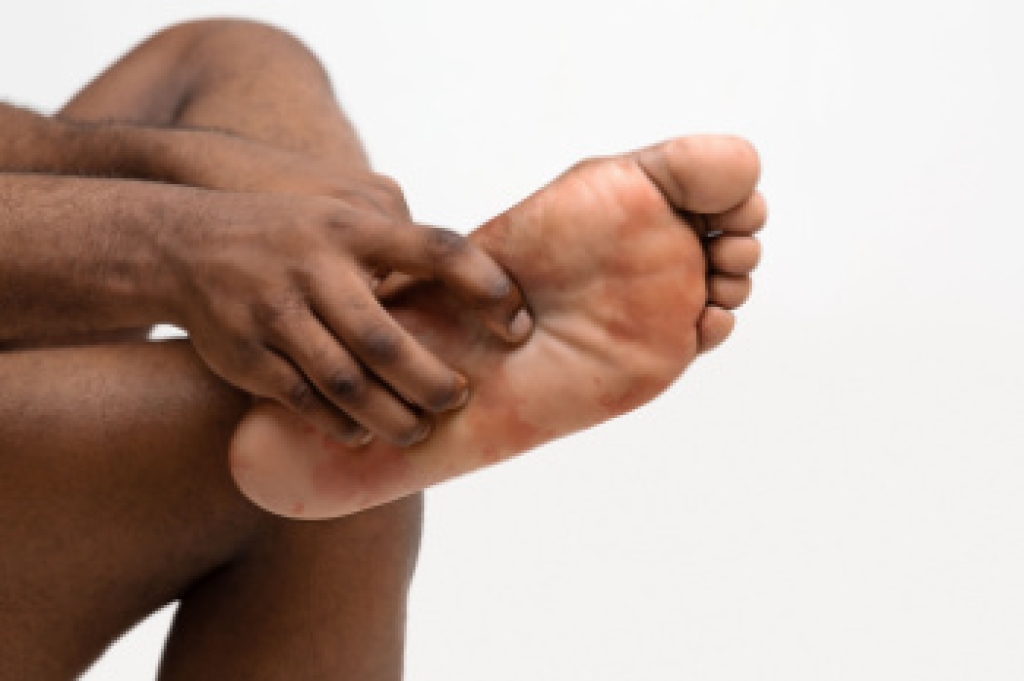 Plantar fasciitis leads to heel pain due to damage done to the thick tissue known as the plantar fascia, that connects your heel bone to your toes. This condition can arise from overstretching or overusing your foot, often in activities like running, dancing, or aerobics. It can also be related to having flat feet, high arches, and being overweight. Pregnant women who stand for long periods may be at risk of developing plantar fasciitis. Symptoms typically include sharp or dull pain under the heel, which worsens with the first steps in the morning or after prolonged activity. Swelling and a burning sensation may also occur. Diagnosis involves an examination of your symptoms, physical activity, and lifestyle, potentially supported by X-rays or other imaging tests. Relief options include wearing supportive shoes or custom orthotic inserts. Additionally, performing specific exercises to stretch the plantar fascia is also beneficial. If you have heel pain related to plantar fasciitis, it is suggested that you schedule an appointment with a chiropodist for an exam.
Plantar fasciitis leads to heel pain due to damage done to the thick tissue known as the plantar fascia, that connects your heel bone to your toes. This condition can arise from overstretching or overusing your foot, often in activities like running, dancing, or aerobics. It can also be related to having flat feet, high arches, and being overweight. Pregnant women who stand for long periods may be at risk of developing plantar fasciitis. Symptoms typically include sharp or dull pain under the heel, which worsens with the first steps in the morning or after prolonged activity. Swelling and a burning sensation may also occur. Diagnosis involves an examination of your symptoms, physical activity, and lifestyle, potentially supported by X-rays or other imaging tests. Relief options include wearing supportive shoes or custom orthotic inserts. Additionally, performing specific exercises to stretch the plantar fascia is also beneficial. If you have heel pain related to plantar fasciitis, it is suggested that you schedule an appointment with a chiropodist for an exam.
Plantar fasciitis can be painful and interfere with your daily activities. If you are experiencing foot or heel pain and believe you may be afflicted with plantar fasciitis, please consult with Emily Yu, B.Sc from Uptown Foot Care Clinic. Our specialist will assess your condition and provide you with quality foot and ankle treatment.
What Is Plantar Fasciitis?
Plantar fasciitis refers to the inflammation of the plantar fascia, a ligament that runs along the bottom of the foot and connects the heel bone to the toes. Repetitive activities, such as running or jumping, can injure the plantar fascia over time. Plantar fasciitis can also be caused by flat feet, high arches, pregnancy, and activities that put excessive pressure on your feet, like standing all day for work. When the plantar fascia becomes inflamed, it causes pain and discomfort.
Symptoms
Typical symptoms of plantar fasciitis include:
- Stabbing pain near the heel
- Pain that is worst in the morning or after a period of rest
- Pain that increases after exercising
- Swelling
- Tightness in the Achilles tendon
Diagnosis
Plantar fasciitis is typically diagnosed via medical history and physical examination.
Treatment
Treatments for plantar fasciitis include resting and icing the affected foot, stretching the foot, taking medications to reduce inflammation, and wearing orthotics. In severe cases where pain does not improve with conservative treatments, injections or surgery may be recommended.
If you have any questions, please feel free to contact our office located in . We offer the newest diagnostic and treatment technologies for all your foot care needs.
